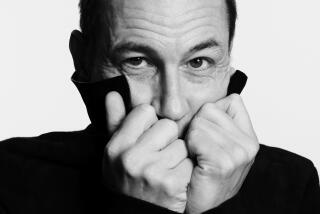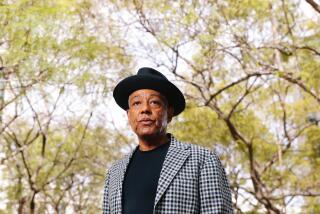STANTON: FROM KILLER TO ANGEL
- Share via
The front door was open, the doormat (“Welcome UFOs and Crew”) was out and music was playing, but Harry Dean Stanton, clad only in his bathrobe, was up on the roof, surveying a huge leak in the ceiling of his Hollywood Hills home.
“I put in solar heating because I thought I’d save money,” he said, coming back into the house. “Of course, now I’ve spent thousands of dollars and I have a leaky roof.”
Stanton cocked an ear toward the stereo, which was playing the theme song from “Paris, Texas,” the critically acclaimed Wim Wenders film which featured a Spanish-language ballad that Stanton sang in the movie himself.
“It’s a Mexican lament,” the veteran character actor said. “He’s saying, ‘I’m far away from the land where I was born, alone and sad, like a leaf on the wind. I live without light, without love. I want to cry, I want to die, with so much feeling.’ ”
Listening to that husky, care-worn baritone, you almost feel as if you’ve heard Stanton’s life story. Like the character he played in “Paris, Texas,” Stanton is a man of few words, a solitary, rootless outsider whose eyes always seem fixed on the horizon.
Stanton has such a faraway gleam in his eyes that when a visitor spotted a pair of binoculars by the door, he wondered if Stanton used them to make flying saucer sightings.
“No,” Stanton cheerfully replied, pointing at the mid-afternoon panoramic view of the San Fernando Valley out his front window. “But on a clear day, you can see the snow on the mountains. The binoculars are there to see how crowded the freeway is before I go out.”
At 59, he has appeared in more than 50 films, playing every role imaginable--drifter, grifter, con man, repo man, blind preacher, dognaper and cop killer. He’s the classic character actor--the face you remember, the voice that catches your ear, the creator of small cinematic gems.
Along with Robert Duvall and Rip Torn, he’s one of the lone wolves of American film. He looks the part--with his dour, deeply lined face, he could easily be a saint or a sinner. As critic F. X. Feeney once put it, Stanton has the air of a “landlocked Ahab who would kill just to see a whale, any whale--to hell with Moby Dick.”
“I was the classic killer,” he said, staring at his shoes. “I always played an angry man. I think it was because I used to really be like that--I was hostile. And because I had a good sense of theatrical truth, I used my anger and rebelliousness and just went with it. Anger was just a part of me.”
The recognition he has received for “Paris, Texas”--as well as the laudatory reviews he won for his portrayal last year of a seedy repossessor in the underground hit “Repo Man”--has changed much of that. Stanton has been popping up everywhere lately, most recently as a scruffy Christmas angel in “One Magic Christmas” and a mysterious father figure in the film adaptation of Sam Shepard’s “Fool for Love.” He plays a more genial paternal role in “Pretty in Pink,” due out Feb. 28.
Sitting cross-legged on his living-room floor, stroking his cat, Michelangelo (“He’s a hunter.”), Stanton had the air of a Beat Generation wise man, quoting sage advice from the I Ching as he spoke freely about the frustrations of his years in obscurity as a supporting player.
“I would’ve preferred to blossom earlier in life,” he said, sliding a half-empty bottle of cognac past a stack of paperbacks and scripts. “I think every actor wants to play those big parts. In the very first play I ever did, I remember understanding all the characters in it. I always felt I could play anyone.
“But after so many years, well, I wondered whether I had the presence, the ability and the sexuality to carry it off. It’s strange how being the romantic lead is such a sacred area--it seems to be such a jealously guarded area. There’s nothing more dynamic in theater or film than the man-woman relationship. Every man, not just actors, wants that acceptance, to be able to accept your sexuality and integrate it into your personality.”
With his impressive work in recent films, Stanton has won much of that acceptance. He’s even become something of a hipster elder statesman, hosting “Saturday Night Live” last month and interviewing Madonna in the December issue of Interview magazine. In fact, it’s not unusual to hear Hollywood film makers--many young enough to be his offspring--saying that they’d like to find a “Harry Dean Stanton type” for a part in their next film.
Stanton isn’t particularly impressed. “That Brat Pack guru label,” he said with a groan. “Give me a break. . . I mean, I was very strengthened by the compliments--Sean Penn told me that he used to watch all my work when he was in high school.”
Stanton laughed. “But I don’t want people to think I suddenly believe I’m some kind of sex symbol. I can just imagine them coming out of ‘Paris, Texas’ and saying, ‘Gee, I didn’t think he was so sexy. He’s still just a shmoo character actor.’ ”
Reminiscing about his work with Wenders on “Paris, Texas,” he said, “There’s a tremendous amount of me in that character. I’ve never really had a family. I have two children that I’ve never really known, never really spent much time with. It was just a while back that I was reunited with my son. . . .” His voice trailed off.
It’s no wonder Stanton seemed so at home on the screen, portraying a man cut off from his family, whose dream of togetherness was symbolized by a photograph of an empty plot of land.
Perhaps that’s why Stanton felt “devastated” by the ending of the film, which cast his character adrift once again. “By the time it was over, it was like reality,” he said. “I couldn’t separate the ending of the film from my own life. It was very hard for me.”
If the role was perhaps the most painful of his career, it was surely the most rewarding.
“It’s a phenomenon,” he said. “Here I am after all these years finally playing the part I wanted to play. If I never did another film after this, I’d be happy.”
This sense of achievement has carried over to his personal life. “I’ve always strived to play characters who had a warmth and tenderness and finally being able to show that sweetness has been a real personal revelation for me. It’s just so frustrating when you’re in a supporting role because you only get to express a part of yourself.
“There’s always a stigma attached to those terms-- character actor, supporting player. It bothers every actor, whether they admit it or not. I guess I’ve always resented the fact that you have your humanity taken away by only playing a sidekick role. Look at Smiley Burnette--he never got a girl in those Gene Autry movies. That would have never happened!”
Though he’s been working steadily, Stanton said he’s careful to choose roles that he believes are positive. He said he only agreed to play the part of Molly Ringwald’s father in “Pretty in Pink” if the character could exhibit a strong sense of dignity. “It’s important for teen-age audiences to see a parent who has a rapport with kids, someone with integrity who they can talk to.
“I’m tired of playing people who are complete washouts and bums. I don’t mind waiting for the good ones to come along. It’s like age. It’s never bothered me. I’ve even forgot my birthday. Many times I’ve wondered if I should tell my real age, but now I think it’s an honor, to be doing what I’m doing now at my age.”
Stanton also heartily endorses the film-acting theory that less is more. “The images don’t lie. If I had a motto, it would be: ‘To be a fine actor, one should never put on an act, never on screen or off.’ ”
It’s easy to see why Stanton’s heroes are aerialists, the circus daredevils who wander across the country, challenging gravity at every stop on the way.
“I don’t feel rooted anywhere. I feel very nomadic, like a warrior or a hunter. It’s always been a big conflict for me to settle down and have a family or put down roots. My body is my home. I’d rather spend my life searching. . . . “
Stanton stared off at the horizon, eyeing his binoculars. “Settling down would be a death for me.”
More to Read
Only good movies
Get the Indie Focus newsletter, Mark Olsen's weekly guide to the world of cinema.
You may occasionally receive promotional content from the Los Angeles Times.









